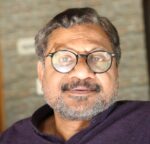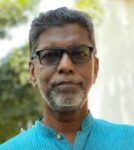Translated from the Malayalam by K.M. Ajir Kutty
Tear Curtain
Be seated, saying thus the poet went inside
On the table were an unopened letter,
an unfinished poem,
and a cup of coffee gone cold.
And in the ashtray was the butt
of a cigarette stuck upside down.
Above the sheaves of paper were
the poet’s historic glasses,
bifocals with a thick frame.
It was through them that
he saw the hues we did not see.
It was through them that
the ordinary scenes scattered
into seven thousand colors in him.
It was through them too
the counter-views went awry.
There must be unseen views
hidden in them.
In those glasses is something
capable of piercing the darkness.
It is not known when shall
the poet come out.
It must be done
before that.
Looked on all four sides
and made sure that
there was nobody around.
Tried the glasses on.
It was as though two drops of water
were put on.
Didn’t see anything.
Some Lines On Patriotism
1.
The birds at the border
are great troublemakers.
Without knowing the ropes
they keep flitting in and out at random.
By the time one comes
within firing range
its citizenship will have changed.
2.
After winning the war
I arrived at the border.
Took part in the
victory celebration.
The area of my patriotism has increased
further to twenty-four and a third
kilometers.
3.
Some hostile forces are fighting
to secede from this country.
If they win, they will become
enemy countries.
How disordered is the arithmetic
of patriotism!
4.
O you who stands guard on
the snow-capped mountains
or on parched deserts
to ensure a sound sleep for me,
will you please assure me that
your bayonet will not be turned
towards me
so that I can sleep peacefully.
5.
The farmer who committed suicide
was dancing, recalling the memories
he had about the harvest.
At that time he heard the national
anthem being sung at a distance.
All of a sudden the ghosts stood
in attention;
O no, said the chief of the ghosts,
we are the dead
we should not make the anthem
a song for the dead.
Ants
Dragonflies evolved into helicopters.
And bulldozers from ant-lions.
Millipedes became trains.
Fighter aircraft were modeled on moths.
Kingfisher became a submarine.
Giraffes evolved into cranes.
Motorbikes from horses.
And radars are from bats.
Evolution is a continuous process besides.
As humans from monkeys
and computers from humans.
But ants…
They did not evolve.
Carrying things too heavy
adding corpses to earth
getting crushed under feet
and drowning in receding rainwater
from the eaves
they continue their existence.
Thunders accompanying some rains
give them wings.
Not knowing what to do at the
altitudes scaled by flying
they fall down shaken.
They come rushing toward the fire in hordes.
They are the curved underlines
in the Holy Book of Evolution.
The Last Day[1]
It is not for nothing that the dead do not speak.
If they spoke, everything would be in trouble.
It would be either bottomless darkness of emptiness
as in the genesis of the world,
or it would be the springtime radiance
of tender leaves just come into life.
Whatever it is, everything would be turned
upside down.
The incessant flow of the angry lava
of the burning injuries.
The brew made by distilling the hate
and abomination of the inner dungeons.
The cycles of revolution that made time
walk forward and backward
Endless accounts of blood and tears
Revelations in which both madness
and dream stand embraced
everything would come bursting open the dams,
if the dead started to speak.
Towers, minarets, and pyramids
all would come toppling down.
Sculptures, symbols, and gigantic wooden roofs
would be reduced to dust.
Imaginations, beliefs, and philosophies
would catch fire and run through
the street clamoring aloud.
The earth, without being able to bear
the weight of sacrifices, meaningless sufferings
and all the absurdities would become a roaring
apocalyptic cry reverberating through
the whole universe.
Thrones would collapse
The holy books would catch fire
Stars would explode
The sky would be like cotton churned.
The sea would be molten, roaring
and billowy
If the dead were to slightly move their lips
all the beards and matted hairs
would wind around the necks as snakes.
The guns, swords, and all the arms
would shy away, shrinking.
The uniforms of the great armies
would come off.
Hunger buried would come out
and dance the death dance.
Hues that were blown out would
begin to glow
Words would run helter-skelter
looking for meanings
and language would turn pale and fall dead,
if the dead were to speak.
Therefore, o the dead ones,
you must not
utter anything, you must not disclose
the netherworld realities, dark truths and
the blind, deaf, and dumb meanings
and the resplendent visages of
the great ignorance
with a slight movement of your lips.
We want to live here.
Notes:
[1]Originally titled Qiyamah. The Arabic word is normally translated as ‘the end of the world’ or as ‘the last day.’
Also, read five classical Chinese poems by monk poet Guanxiu, translated into English by Xiaoqui Qui, and published in The Antonym:
Follow The Antonym’s Facebook page and Instagram account for more content and interesting updates.



























Interesting and impressive work,thanks to Mr Ajeerkutty.
Looking forward for more of same style and stuff.